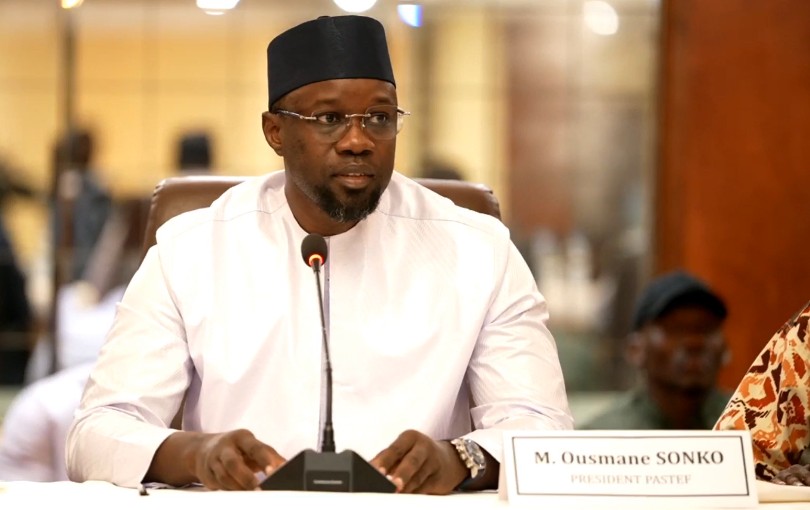Gambiaj.com – (Dakar, Senegal) – Senegalese Prime Minister Ousmane Sonko has unveiled an ambitious National Economic and Social Recovery Plan, pledging to steer the country out of its deepening economic crisis without relying on the International Monetary Fund (IMF). The announcement came on Friday at the Grand Théâtre in Dakar, where Sonko presented the strategy alongside President Bassirou Diomaye Faye before an audience of lawmakers, diplomats, union leaders, business representatives, and civil society.
Adopted by the Council of Ministers on July 30, the three-year plan forms part of the broader “Sénégal 2050” vision. Its primary goal: to reduce Senegal’s public deficit from the current alarming rate of 14% to just 3% by 2027—without accumulating further debt.
“We do not need the IMF,” Sonko declared defiantly, reaffirming his government’s commitment to economic sovereignty and endogenous financing.
Austerity with a Strategic Vision Under Mounting Fiscal Pressures
The recovery blueprint includes a mix of austerity measures and innovative revenue-generation strategies. These include increased taxation on sectors like online gambling, tobacco, and mobile money transactions. The plan also introduces paid visa requirements for non-African visitors.
Further steps include downsizing the public sector, rationalizing state expenditures, launching a national savings campaign, and monetizing portions of former French military bases—although that proposal faces resistance from Senegal’s armed forces.
The Prime Minister stressed that funds raised would be channeled toward improving living conditions, strengthening public services, and supporting the national private sector, which has long struggled under foreign competition and structural imbalances.
The urgency of the plan comes against the backdrop of Senegal’s deteriorating economic fundamentals. According to the government, public debt stands at 119% of GDP. Additionally, the administration recently uncovered a previously undisclosed debt of CFA 5 billion (approximately USD 8.3 million) inherited from the previous government.
In recent months, credit rating agencies have downgraded Senegal’s status, limiting access to international capital markets. With donor confidence eroding, the government is turning inward to fund development goals and regain fiscal stability.
A Radical Shift from IMF Reliance
Sonko’s approach marks a sharp break from past economic management in Senegal, which heavily relied on IMF support. Just last year, under the previous administration, Senegal entered a new program with the IMF to help stabilize the economy amid rising global debt pressures.
The current leadership has signaled its dissatisfaction with those arrangements, particularly the austerity prescriptions often attached to them.
This week, Senegal’s government also postponed a scheduled IMF evaluation mission, further signaling a recalibration of its engagement with international financial institutions.
The rejection of IMF dependency echoes a broader trend across parts of Africa, where governments, emboldened by rising nationalist sentiment and public pressure, are seeking homegrown solutions to economic challenges.
Despite the rhetoric of self-reliance, experts warn that the plan’s success will hinge on careful implementation and public buy-in. Senegal’s ability to broaden its tax base, curb corruption, and navigate pushback from vested interests will be critical.
Meanwhile, social expectations are high. Rising food prices and unemployment have triggered widespread dissatisfaction, and the Faye-Sonko administration is under pressure to deliver tangible results quickly.
For now, the National Economic and Social Recovery Plan represents one of the most comprehensive and politically audacious attempts to reshape Senegal’s economic future—on its own terms.










